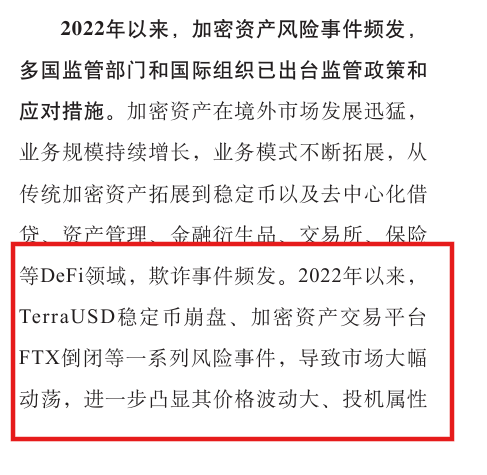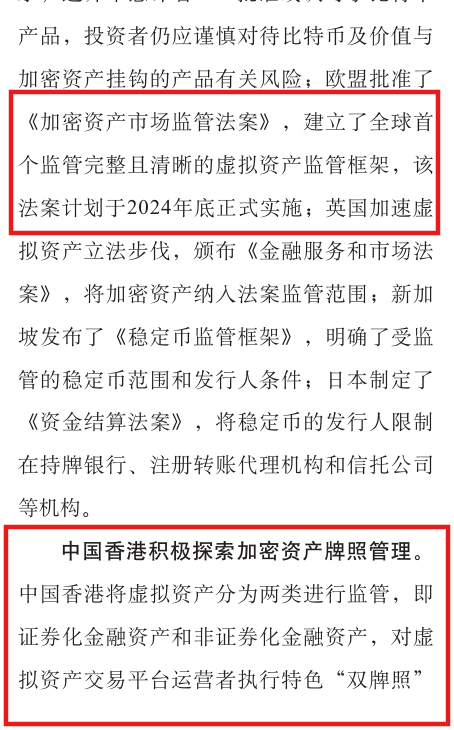Some time ago, the "2024 China Financial Stability Report" was released, which mentioned for the first time the latest developments in global cryptocurrencies and related legislation, and especially gave a relatively detailed explanation of Hong Kong's practices in the field of cryptocurrency.
In this context, the report not only reflects the central bank's changing attitude towards crypto assets, but also shows my country's continued attention and gradual exploration of this emerging industry. Let's take a look at the specific changes:
1. From prudent supervision to objective description: the central bank’s attitude towards crypto assets has changed
The 2023 Central Bank Financial Stability Report states that:

The 2024 Central Bank Financial Stability Report states that:

From the wording of the financial stability reports released by the central bank in 2023 and 2024, we can see that compared with last year, the 2024 China Financial Stability Report has a noteworthy shift in its attitude towards crypto assets. In the 2023 report, the central bank mainly focused on the financial and technological risks of crypto assets, emphasized its possible spillover effects on financial stability, and proposed strict regulatory measures.
However, in this year's report, the central bank did not show too much negative attitude towards the practice of crypto assets. Although the central bank continued to emphasize the risks of crypto assets, it paid special attention to the recovery of the crypto asset market and global development trends, and objectively commented on the legislative practices of various countries and government organizations in cryptocurrency regulation.
The report states:
Although the market price and trading volume of crypto assets have rebounded in 2023 after a series of risk events, there are still potential risks such as large price fluctuations and opaque market governance. At the same time, regulatory authorities in various countries have continuously strengthened their supervision of crypto assets, and many countries around the world have introduced relevant regulations.
Hong Kong, China has made positive progress in exploring the management of crypto asset licenses and further strengthened supervision of virtual asset trading platforms.
The Financial Stability Report not only mentions the market size and risks of cryptocurrencies, but also provides an overview of the global legal framework and regulatory model, suggesting that China's financial regulators are also paying attention to the compliance process of this market. We can reasonably expect whether it is possible to pass more legislation and policies to adapt to current changes.
2. Cryptocurrency Practices in Hong Kong
One of the highlights of the report is that for the first time, a special and detailed description of Hong Kong's practical exploration and innovative achievements in the field of cryptocurrency was made. As an indispensable part of the financial system market in mainland China, Hong Kong's cryptocurrency regulatory practices have attracted national attention. Hong Kong has creatively implemented a "dual license" regulatory system , which accurately divides virtual asset trading platforms into two categories: securities and non-securities , and regulates them with legal frameworks that fit their characteristics. This innovative regulatory model has not only triggered widespread heated discussions and in-depth discussions in the market, but has also become a distinctive feature of Hong Kong's crypto asset market.
By clearly distinguishing between "security tokens" and "non-security tokens" , Hong Kong has built a more detailed and flexible regulatory framework for the cryptocurrency industry. This framework not only ensures the standardized operation of the market, but also effectively enhances the compliance awareness of market participants through the licensing system. Hong Kong's cryptocurrency regulatory practice undoubtedly provides valuable reference and reference for other regions in the exploration of crypto asset regulation.
In addition, it is not difficult to find from the disclosure of the Financial Stability Report that many experts and scholars are closely following the development trends of related industries in Hong Kong, and actively formulating and improving relevant laws and regulations based on their development status and trends, in order to better adapt to and regulate the financial environment under the new situation.
3. Repeated mention of global stablecoins - central banks' regulatory attention to global stablecoins
The report mentioned the Chinese central bank's attention to global stablecoins many times. As an important branch of cryptocurrency, stablecoins have gradually become a research hotspot in the global financial market due to their relatively stable value mechanism. In recent years, the rapid development of stablecoins has attracted great attention from central banks around the world. Many countries are intensively studying how to effectively regulate this emerging asset, while ensuring financial stability and tapping its potential value.
The People's Bank of China's attention to global stablecoins shows China's forward-looking thinking in financial stability and its sharp insight into the emerging trends of the international financial industry. Stablecoins are linked to traditional fiat currencies and have a certain degree of stability, but their potential in cross-border payments and financial market liquidity also makes them a test field for financial policies in many countries. Against this background, the People's Bank of China's attention to and continued research on stablecoins is not only a response to changes in the global market, but also a reflection of China's gradual involvement and exploration in the field of cryptocurrency.
4. Prospects of the cryptocurrency market: national attitude and the future of the industry
In summary, although the regulation of the cryptocurrency market is still in the stage of continuous exploration and in-depth research, the 2024 China Financial Stability Report shows that the attitude of the People's Bank of China towards cryptocurrencies is changing, and the practical experience of Hong Kong has made the market prospects of the industry attract more market participants, experts, scholars and related industry practitioners. In particular, the regulatory system of cryptocurrencies has been gradually improved worldwide, and the innovation and standardization process of related industries has been gradually accelerated.
5. The lawyer believes
From the perspective of regulators: major platforms should be properly supervised for their platform transactions and business activities to ensure that the activities are carried out within the framework of legality and compliance. At the same time, the focus of supervision should be to provide clearer and more specific regulations and reduce gray areas to avoid misjudgment of legitimate and legal trading behaviors.
From the perspective of law enforcement: public power should be supervised and should not act recklessly in gray areas, disrupting the development of the industry ecology.
As for financial investment activities: Currently in mainland China, institutions involved in cryptocurrency speculation and the cryptocurrency circle are still prone to illegal financial activities. In the absence of relevant laws and departmental regulations, mainland investors involved in the field of crypto-finance do face higher legal risks and difficulties in protecting their rights.
Here, we sincerely remind investors that due to the high-risk nature of crypto-financial products, participants need to always strengthen their compliance awareness. Non-professional investors or individuals who lack the corresponding investment experience and knowledge should be cautious and avoid blindly entering the market, so as not to transform investment behavior into high-risk "gambling."
As the regulatory environment continues to optimize and mature, investors, financial institutions, and government departments must continuously improve their understanding and adaptability to the evolving financial system and market dynamics.
This article only represents the personal views of the author and does not constitute legal advice or legal opinion on specific matters.













